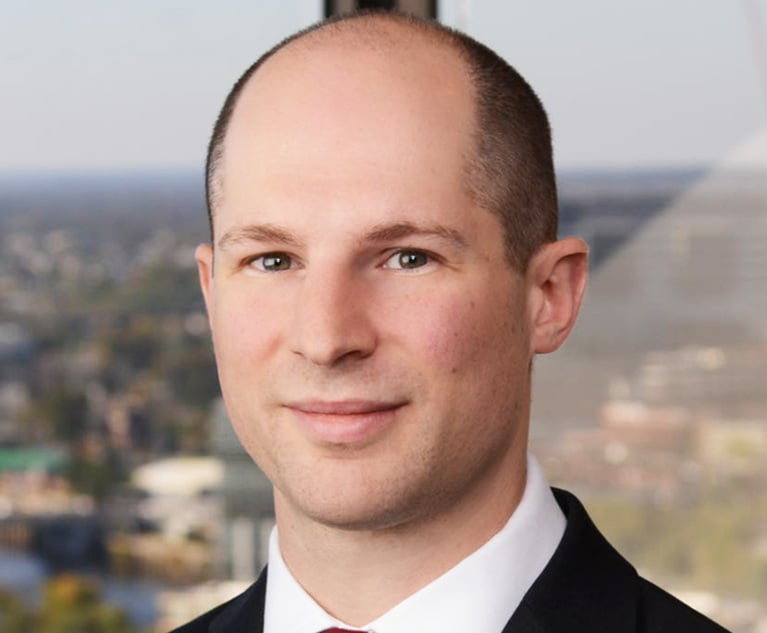HR Exec's Tweet to Trump Not Grounds to Deny UC Benefits, Court Rules
A former HR executive's tweet to then-candidate Donald Trump during the 2016 U.S. presidential race was enough to get her fired from her job, but, according to a Pennsylvania appeals court, not enough to block her from receiving unemployment compensation benefits.
November 15, 2017 at 10:40 AM
5 minute read

A former human resources executive's tweet to then-candidate Donald Trump during the 2016 U.S. presidential race was enough to get her fired from her job, but, according to a Pennsylvania appeals court, not enough to block her from receiving unemployment compensation benefits.
In a precedential Nov. 13 opinion that offered some guidance on what it means for employees to represent their employers on social media, a unanimous three-judge panel of the Commonwealth Court upheld the Unemployment Compensation Board of Review's decision to grant UC benefits to Kathleen M. Jungclaus. The appeals court rejected her former employer's argument that the offending tweet constituted willful misconduct under Section 402(e) of the Unemployment Compensation Law because it violated the company's social media and communications policies.
According to the opinion, Jungclaus was fired from her position as vice president of human resources at continuing care retirement community Waverly Heights in September 2016 for the July 2016 tweet to @realDonaldTrump that read, “'I am the VP of HR in a comp outside of philly an informal survey of our employees shows 100% AA employees voting Trump!'”
Jungclaus subsequently applied for UC benefits, which were granted by a local service center. Waverly Heights appealed, arguing that Jungclaus' tweet had violated the company's social media policy, which states, in part: “[Employer] expects employees who identify themselves with [employer] in either internal or external social media to conduct themselves according to this policy.” A referee agreed and reversed the grant of benefits, according to the Commonwealth Court's opinion.
Jungclaus then appealed to the board, which ultimately reinstated benefits after finding that she did not identify herself in the tweet as being associated with Waverly Heights and therefore did not violate the social media policy.
On appeal to the Commonwealth Court, Waverly Heights argued that anyone viewing the tweet could have easily identified Jungclaus' employer through a Google search.
But Judge Michael H. Wojcik, writing for the Commonwealth Court panel, said that wasn't enough for the tweet to be in violation of the company's social media policy.
“Her personal Twitter feed did not represent the employer,” Wojcik said. “While one could investigate claimant and ultimately determine the identity of her employer in the process, the board reasoned such is not the standard presented by employer's social media policy. Employer's policy clearly pertained to 'employees who identify themselves with employer.' Because claimant did not identify employer in her tweet or otherwise hold herself out as a representative of employer on her personal Twitter page, the policy did not apply.”
In addition, Wojcik agreed with the board's determination that the mere fact that Jungclaus followed Waverly Heights' Twitter account did not mean her account was “linked” to the company's account. Therefore, Wojcik said, the tweet in question did not constitute a violation of the company's communication policy, which states that employees may not ”'link from a personal blog or social networking site to [employer's] internal or external website.'”
Wojcik was joined by Judge P. Kevin Brobson and Senior Judge Dan Pellegrini.
Waverly Heights also argued that Jungclaus' tweet was “'racially charged'” and that it confirmed that she inappropriately conducted a workplace survey that “'singled out African-American staff and asked them their political preferences.'”
The panel rejected these arguments as well, in part because Jungclaus never admitted that “AA,” as used in her tweet, stood for “African-American.”
“The certified record contains an exhibit listing various meanings for the acronym 'AA,' the first of which is 'Alcoholics Anonymous,' followed by 'African Americans,'” Wojcik said. “Claimant testified it stood for 'administrative assistants.'”
Regardless, Wojcik added, the tweet did not say Jungclaus polled only African-American employees and Waverly Heights offered no proof beyond the tweet itself that Jungclaus actually conducted any survey at all.
“In fact, employer's witness testified that claimant merely shared a conversation with her regarding political preferences, but 'it wasn't necessarily that she told me she was conducting any polls, it was just a conversation that she had shared,'” Wojcik said. “Mere discussions about current affairs, such as an upcoming presidential election, do not rise to a level of disqualifying willful misconduct.”
But Wojcik made clear that the court's decision in the case pertained only to whether Jungclaus was entitled to UC benefits and was not intended to question Waverly Heights' decision to terminate an at-will employee.
“The issue of whether an employer can rightfully discharge an employee is separate from, and not relevant to, the issue of whether a claimant is eligible for UC benefits,” the judge said.
Jungclaus has, however, filed an age and sex discrimination lawsuit against Waverly Heights in the U.S. District Court for the Eastern District of Pennsylvania, alleging her firing was retaliation against her for advocating for the equal treatment of women and that the tweet was merely a pretext.
The federal complaint was filed Oct. 6 against Waverly Heights and its president and chief executive officer, Thomas P. Garvin. The defendants have not yet filed a response in that case.
Counsel for Waverly Heights in both the state and federal court actions, Grace M. Deon of Eastburn and Gray in Doylestown, was out of the country and could not immediately be reached for comment.
Jungclaus' attorney in both cases, Mark D. Schwartz of Bryn Mawr, said he took particular issue with Waverly Heights' claims that his client, who is not African-American, had a racial motivation behind sending the tweet, which he said was not true.
He also said that he was pleasantly surprised that the Commonwealth Court's opinion addressed and dismantled each of Waverly Heights' arguments in such detail.
“I think they got slammed,” he said. “Rightfully, they got slammed.”
This content has been archived. It is available through our partners, LexisNexis® and Bloomberg Law.
To view this content, please continue to their sites.
Not a Lexis Subscriber?
Subscribe Now
Not a Bloomberg Law Subscriber?
Subscribe Now
NOT FOR REPRINT
© 2024 ALM Global, LLC, All Rights Reserved. Request academic re-use from www.copyright.com. All other uses, submit a request to [email protected]. For more information visit Asset & Logo Licensing.
You Might Like
View All
While Data Breaches May Lead to Years of Legal Battles, Cyberattacks Can Be Prevented
4 minute read
The Growing PFAS Morass: Why Insurance Should Cover These Products Liability Claims
9 minute read
Trending Stories
- 1Gibson Dunn Sued By Crypto Client After Lateral Hire Causes Conflict of Interest
- 2Trump's Solicitor General Expected to 'Flip' Prelogar's Positions at Supreme Court
- 3Pharmacy Lawyers See Promise in NY Regulator's Curbs on PBM Industry
- 4Outgoing USPTO Director Kathi Vidal: ‘We All Want the Country to Be in a Better Place’
- 5Supreme Court Will Review Constitutionality Of FCC's Universal Service Fund
Who Got The Work
Michael G. Bongiorno, Andrew Scott Dulberg and Elizabeth E. Driscoll from Wilmer Cutler Pickering Hale and Dorr have stepped in to represent Symbotic Inc., an A.I.-enabled technology platform that focuses on increasing supply chain efficiency, and other defendants in a pending shareholder derivative lawsuit. The case, filed Oct. 2 in Massachusetts District Court by the Brown Law Firm on behalf of Stephen Austen, accuses certain officers and directors of misleading investors in regard to Symbotic's potential for margin growth by failing to disclose that the company was not equipped to timely deploy its systems or manage expenses through project delays. The case, assigned to U.S. District Judge Nathaniel M. Gorton, is 1:24-cv-12522, Austen v. Cohen et al.
Who Got The Work
Edmund Polubinski and Marie Killmond of Davis Polk & Wardwell have entered appearances for data platform software development company MongoDB and other defendants in a pending shareholder derivative lawsuit. The action, filed Oct. 7 in New York Southern District Court by the Brown Law Firm, accuses the company's directors and/or officers of falsely expressing confidence in the company’s restructuring of its sales incentive plan and downplaying the severity of decreases in its upfront commitments. The case is 1:24-cv-07594, Roy v. Ittycheria et al.
Who Got The Work
Amy O. Bruchs and Kurt F. Ellison of Michael Best & Friedrich have entered appearances for Epic Systems Corp. in a pending employment discrimination lawsuit. The suit was filed Sept. 7 in Wisconsin Western District Court by Levine Eisberner LLC and Siri & Glimstad on behalf of a project manager who claims that he was wrongfully terminated after applying for a religious exemption to the defendant's COVID-19 vaccine mandate. The case, assigned to U.S. Magistrate Judge Anita Marie Boor, is 3:24-cv-00630, Secker, Nathan v. Epic Systems Corporation.
Who Got The Work
David X. Sullivan, Thomas J. Finn and Gregory A. Hall from McCarter & English have entered appearances for Sunrun Installation Services in a pending civil rights lawsuit. The complaint was filed Sept. 4 in Connecticut District Court by attorney Robert M. Berke on behalf of former employee George Edward Steins, who was arrested and charged with employing an unregistered home improvement salesperson. The complaint alleges that had Sunrun informed the Connecticut Department of Consumer Protection that the plaintiff's employment had ended in 2017 and that he no longer held Sunrun's home improvement contractor license, he would not have been hit with charges, which were dismissed in May 2024. The case, assigned to U.S. District Judge Jeffrey A. Meyer, is 3:24-cv-01423, Steins v. Sunrun, Inc. et al.
Who Got The Work
Greenberg Traurig shareholder Joshua L. Raskin has entered an appearance for boohoo.com UK Ltd. in a pending patent infringement lawsuit. The suit, filed Sept. 3 in Texas Eastern District Court by Rozier Hardt McDonough on behalf of Alto Dynamics, asserts five patents related to an online shopping platform. The case, assigned to U.S. District Judge Rodney Gilstrap, is 2:24-cv-00719, Alto Dynamics, LLC v. boohoo.com UK Limited.
Featured Firms
Law Offices of Gary Martin Hays & Associates, P.C.
(470) 294-1674
Law Offices of Mark E. Salomone
(857) 444-6468
Smith & Hassler
(713) 739-1250






